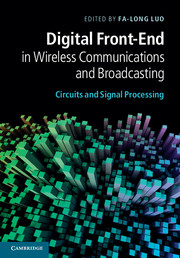Book contents
- Frontmatter
- Contents
- Contributors
- Preface
- Part I Introduction to digital front-end
- Part II DPD and CFR
- Part III DUC, DDC, ADC, DAC, and NCO
- Part IV Digital calibration, imbalance compensation, and error corrections
- 16 Digital compensation and calibration of I/Q gain and phase imbalances
- 17 Joint digital predistortion of I/Q modulator and power amplifier impairments
- 18 Diversity and error compensation in OFDM transceivers
- 19 Front-end architectures and impairment corrections in multimode and multi-antenna systems
- Part V Circuits and system integration in digital front-end
- Index
- References
16 - Digital compensation and calibration of I/Q gain and phase imbalances
from Part IV - Digital calibration, imbalance compensation, and error corrections
Published online by Cambridge University Press: 07 October 2011
- Frontmatter
- Contents
- Contributors
- Preface
- Part I Introduction to digital front-end
- Part II DPD and CFR
- Part III DUC, DDC, ADC, DAC, and NCO
- Part IV Digital calibration, imbalance compensation, and error corrections
- 16 Digital compensation and calibration of I/Q gain and phase imbalances
- 17 Joint digital predistortion of I/Q modulator and power amplifier impairments
- 18 Diversity and error compensation in OFDM transceivers
- 19 Front-end architectures and impairment corrections in multimode and multi-antenna systems
- Part V Circuits and system integration in digital front-end
- Index
- References
Summary
Introduction
The implementation challenges in building compact and low-cost radios for future wireless systems are continuously growing. This is partially due to the introduction of multi-antenna transmission techniques as well as the use of wideband communication waveforms and high-order symbol alphabets, in addition to the increasing demands for more efficient radio spectrum utilization through e.g. carrier aggregation and scattered spectrum use. In general, implementations of several parallel radios with wide operating bandwidth and high performance, in terms of linearity and spurious free dynamic range, are required in a single device. Then, to keep the overall implementation costs and size feasible, simplified radio architectures and lower-cost radio electronics are typically used. This in turn implies that various nonidealities in the deployed analog radio frequency (RF) modules, stemming from the unavoidable physical limitations of the electronics used, are expected to play a critical role in future radio devices.
Good examples of the above “dirty-RF” paradigm [1], [2] are, e.g., oscillator phase noise, power amplifier (PA) nonlinearities, imperfections of the sampling and analog-to-digital (A/D) interface, in-phase/quadrature (I/Q) branch amplitude and phase mismatches, as well as nonlinearities of receiver small signal components like low-noise amplifiers (LNAs) and mixers. In this chapter, we will focus on the behavioral modeling and digital signal processing (DSP) based mitigation of I/Q imbalances and the resulting mirror-frequency interference in direct-conversion type radio transmitters and receivers. For generality, in most of the developments, the I/Q imbalances are assumed to be frequency-dependent within the processed bandwidth, which is then built in to both modeling as well as mitigation algorithms. Also an extensive list of state-of-the-art literature is given.
- Type
- Chapter
- Information
- Digital Front-End in Wireless Communications and BroadcastingCircuits and Signal Processing, pp. 475 - 501Publisher: Cambridge University PressPrint publication year: 2011
References
- 2
- Cited by



